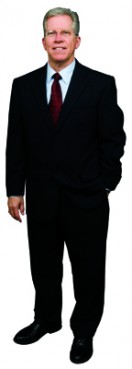
(RNS1-MAY12) Darryl Tippens is provost of Pepperdine University and co-convener of the Ascending Voice II conference to promote a cappella singing in U.S. churches. For use with RNS-10-MINUTES, transmitted May 12, 2010. RNS photo courtesy Ron Hall/Pepperdine University.
(RNS) The psalmist said to praise God with trumpets, harps, tambourines and loud clanging cymbals, but some Christian churches shun all instruments in favor of good old-fashioned a cappella singing.
Provost Darryl Tippens is helping convene the second conference on preserving a cappella music at Pepperdine University, which is affiliated with the non-instrumental Churches of Christ.
The Ascending Voice II conference, which opened Wednesday (May 12), includes not only members of his Churches of Christ but Mennonites, Eastern Orthodox, Episcopalians and Roman Catholics who face an uphill battle against the popularity of praise bands and recorded music.
The interview has been edited for length and clarity.
Q: Is it too dramatic to say that you’re holding this conference to try to keep the tradition of sacred a cappella music alive?
A: Psalm-singing and singing in churches and synagogues literally goes back more than 2,000 years. I don’t think it’s going away in any absolute sense. But if you ask me if it’s at risk, absolutely it is at risk.
Q: The Churches of Christ is known for its a cappella churches. But does that tradition span other denominations?
A: We’re finding people in many Christian traditions that do have instrumental music; they are also worried and concerned about the demise — one might say even the marginalization — of the voice of the people in the congregation.
If you think of worship as the voice of the people expressing its heart to God, is that good when the people go silent?
Q: You can find a cappella music in everything from Renaissance music to gospel. Is there a common denominator, something that makes people want to sing and hear music without instruments?
A: Yes, absolutely. No instrument can capture the pathos, the passion, the heart that comes from the human voice. That’s why it will never be completely displaced.
Q: Do you attribute the fading of this tradition to the growth of megachurches?
A: I don’t think it can be attributed to, or blamed on, the megachurches. I do think there are styles of worship that megachurches employ that many other, much smaller churches employ, and they’re the same tools or devices that have perhaps the unintentional effect of displacing the voice of the congregation.
Q: What are some examples of religious a cappella music that have endured?
A: The African churches have preserved very powerful a cappella music. I went to a Judy Collins concert the other night and she sang “Amazing Grace” a cappella. When the instruments would stop and she would sing solo, it was the most affecting part of the concert.
Q: A cappella songs like “We Shall Overcome” were a central part of the civil rights movement and other protest movements. What made those endure?
A: It derives from some deep source from within. It’s much like what the blues do, if you think about it. Blues is kind of a secularized form of gospel, where it speaks your own pain but it also ministers to your pain.
Q: How does a cappella music square with Psalm 150, which speaks of praising God with harp, trumpet and stringed instruments?
A: The Old Testament and the Psalms are filled with references to musical instruments. Early Christians didn’t deny that there were musical instruments in Jewish worship. What they said was, “we are now the instruments.”
Q: Since the first conference you had three years ago, do you see more of a resurgence or a decline in a cappella music?
A: What I’m seeing is a growing awareness that with or without musical instruments, the loss of congregational singing is a huge question. A worship experience is fundamentally different when everybody in the congregation is truly singing with their hearts as well as with their voices. If you displace that, if you remove it from the service, you are in a very different place and that’s not a good place.




